Weekly Mailbag: 5/8/17 – 5/14/17
We have an opportunity for you to hit us up with your questions in this, our weekly mailbag feature. Have a question regarding player movement, the salary cap or the NBA draft? Drop us a line at HoopsRumorsMailbag@Gmail.com. Here are this week’s inquiries:
Five Key Offseason Questions: Chicago Bulls
Whether “Three Alphas” were too many or too few, this season didn’t turn out the way the Bulls hoped when they signed Dwyane Wade and Rajon Rondo to team with Jimmy Butler. After spending much of the year teetering on the edge of disaster, Chicago put together a late-season surge to claim the East’s final playoff spot.
Now the Bulls have to decide if they want to go through it all again. There’s no guarantee that Wade, Rondo or Butler will still be in Chicago next season, but there’s also a decent chance that they might all come back. If they do return, the Bulls need to spend the summer finding the right pieces to put around them, something that never happened this season. The other option is a complete rebuilding project, which some in the front office reportedly favor, but which Bulls fans may not be ready to accept.
Here are five key questions as Chicago embarks on an unpredictable offseason:
1. Is Butler a franchise player?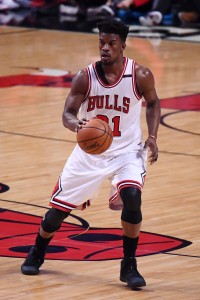
It’s not often you hear an All-Star-level professional athlete get upset about a preposition, but Butler reportedly become angry when VP of basketball operations John Paxson said, “We are building with Jimmy right now.” Butler planned to make it clear in a post-season meeting with management that he is the type of player to build around, not just with.
Regardless of the wording, Butler is the key to Chicago’s future. He is under contract for the next two seasons at nearly $18.7MM and $19.9MM before entering an option year in 2019/20. So the Bulls can try to piece together a title contender, or they can trade him and start rebuilding. The Celtics, who may own the top pick in this year’s draft, were very interested last summer, as were the Timberwolves, who are run by Butler’s former Chicago coach, Tom Thibodeau.
The Bulls have a lot of dominoes that could fall in a lot of different directions this offseason, but the decision that will affect all others is whether to blow up the current team and take the best deal for Butler or keep him as the centerpiece to build around (or with).
Hoops Rumors Originals: 5/7/17 – 5/13/17
Every week, the Hoops Rumors writing team compiles original content to complement our news feed. Here are some of our favorite segments and features from the past seven days:
- Stay current with Hoops Rumors’ player option decision tracker.
- Luke Adams helps you comprehend team’s specific salary cap landscapes with three more analyses in his Salary Cap Digest series: the Jazz, Raptors, and Rockets.
- Luke Adams also contributed three more installments to his Five Offseason Questions series: the Blazers, Hawks, and Grizzlies.
- Which free agents are raising their stock most this postseason? Chris Crouse has the details.
- Arthur Hill talks Dwane Casey, Gordon Hayward, and under-the-radar free agents in his weekly Sunday mailbag. Submit your questions via Twitter (@HoopsRumors) or by sending us an email (hoopsrumorsmailbag@gmail.com).
- In our weekly Hoops Links roundup of interesting articles from around the blogosphere, Austin Kent shares pieces on a Kristaps Porzingis conspiracy theory and a lack of accountability from Andre Drummond and Chandler Parsons.
- Luke Adams breaks down why NBA sign-and-trades are rare.
- Interested in rookie scale salaries for 2017 first-round picks? Luke Adams has you covered.
- Here are the questions we asked you in our Community Shootaround discussions and polls this week:
- Where do you think Kyle Lowry ends up?
- Is Serge Ibaka worth a long-term investment?
- Who would give the Warriors a tougher battle in the Western Conference Finals: the Rockets or Spurs?
- Can fatigue be blamed for James Harden‘s poor Games 5 and 6?
- Who will emerge victorious: the Celtics or the Wizards?
- Who will win the Spurs–Rockets series?
- Last, but certainly not least: Please check out our new Trade Rumors App for IOS/Android.
Community Shootaround: James Harden’s Endurance
After a 39-point loss in Game 6 of the Western Conference Semifinals against the Spurs, Rockets‘ point guard James Harden has been scrutinized for his poor performance in the series-clinching game. Harden posted just 10 points on 2-of-11 shooting with six turnovers, one game after he posted similar totals of 10 points (3-of-11 shooting) and six turnovers in the second half and overtime of a 110-107 loss in Game 5.
Harden enjoyed a historic regular season, averaging 29.1 points, 11.2 assists and 8.1 rebounds per game. He is in the conversation for the Most Valuable Player award with fellow point guard Russell Westbrook, who became the first player since Oscar Robertson to average a triple-double for an entire season. Now, looking back at Harden’s two clunkers, fatigue from a strenuous season may have set in.
Rockets head coach Mike D’Antoni said in his exit interview with reporters, including ESPN’s Tim MacMahon, that perhaps resting Harden more next season will keep him sharper.
“All great players think they can do everything,” D’Antoni said. “Maybe he does need to take a game off here and there. ‘Hey, you’re nicked up a little bit, don’t play, maybe.’ Something to talk about, but that’s also his greatness, too. So it’s hard. It’s very delicate.”
Harden played in 81 regular season games, his third consecutive season of at least 81 games. If Harden’s playoff games over the last three years are added, he has played in 277 total games. Both D’Antoni and general manager Daryl Morey indicated that getting Harden, who turns 28 in August, more rest will be a goal next season.
“The offense will get better,” D’Antoni added.“I can get him off the ball some. I can save his legs a little bit and have more confidence [in other ball handlers]. Pat Beverley can run the team a little bit. We can do different things.”
That leaves a few things to be considered: Was fatigue to blame in Harden’s poor Game 5 and Game 6 outings or was it just a few off nights? Also, does it makes sense for the Rockets to rest him more frequently next season despite his tremendous offensive production?
Share your thoughts on Harden in the comments section below!
Five Key Offseason Questions: Memphis Grizzlies
The Grizzlies entered the 2016/17 season with high expectations, having hired David Fizdale to replace former head coach Dave Joerger and having locked up Chandler Parsons to a lucrative new four-year contract. However, 2016/17 looked a lot like 2015/16 for the Grizzlies, who increased their win total from 42 to 43 and managed to take the Spurs to six games in the first round instead of four.
In Mike Conley and Marc Gasol, Memphis has two cornerstone pieces, both of whom were at their best this past season, establishing new career-highs in scoring. But the Grizzlies have been unable to find the right complementary players necessary to take the next step — or at least have been unable to keep those players healthy.
Here are five questions facing the Grizzlies as they enter the offseason…
1. Can the Grizzlies count on Chandler Parsons to be a legit contributor?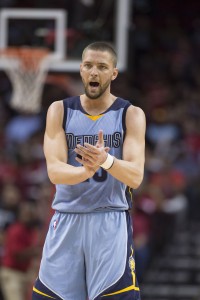
A year ago, the Mavericks decided not to bring back Parsons on a max deal, opting instead for Harrison Barnes. That decision raised some eyebrows at the time, but Dallas knew better than anyone that Parsons’ injury history was a red flag, as the Grizzlies saw first-hand during his first season in Memphis.
Parsons appeared in just 34 games for the Grizzlies in 2016/17, and even when he was able to get on the court, he struggled badly, shooting just 33.8% from the field and 26.9% on three-pointers. Both marks were career worsts by far.
Parsons was a career 38.0% three-point shooter before arriving in Memphis, and if he can regain his old form, he’d be an ideal threat on the wing to help take the scoring load off Conley and Gasol. But if Parsons continues to battle injuries, his contract – which is guaranteed for $72MM+ over the next three years – will be an albatross on Memphis’ cap, limiting the team’s flexibility to add other pieces.
2017 Offseason Salary Cap Digest: Houston Rockets
The Rockets outperformed expectations in 2016/17, with James Harden receiving MVP consideration and Mike D’Antoni entering the Coach of the Year discussion as the club set records for three-point shooting. However, the season ended on a sour note, and Daryl Morey won’t have as much cap flexibility to make roster additions this summer as he did a year ago, when Houston landed Ryan Anderson and Eric Gordon.
Here’s where things currently stand for the Rockets financially, as we continue our Offseason Salary Cap Digest series for 2017:
Guaranteed Salary
- James Harden ($28,299,399)
- Ryan Anderson ($19,578,455)
- Eric Gordon ($12,943,020)
- Trevor Ariza ($7,420,912)
- Lou Williams ($7,000,000)
- Patrick Beverley ($5,513,514)
- Clint Capela ($2,334,528)
- Sam Dekker ($1,794,600)
- Montrezl Harrell ($1,471,382)
- Chinanu Onuaku ($1,312,611)
- Total: $87,668,421
Player Options
- None
Team Options
- None
Non-Guaranteed Salary
- Kyle Wiltjer ($1,312,611)1
- Isaiah Taylor ($1,312,611)
- Total: $2,625,222
Restricted Free Agents
- Bobby Brown ($1,724,305 qualifying offer / $1,724,305 cap hold)
- Troy Williams ($1,512,611 qualifying offer / $1,512,611 cap hold)
- Total: $3,236,916
Cap Holds
- Nene ($3,477,600)
- Total: $3,477,600
Projected Salary Cap: $101,000,000
Maximum Cap Room: $11,700,349
- With more than $87MM on their 2017/18 cap in the form of guaranteed salaries, the Rockets would have a team salary of $89,299,651 if they added a couple cap charges for empty roster spots to that total. That would give the club about $11.7MM in cap room, which isn’t much more than what the mid-level exception is expected to be worth. In order to clear out additional space, a trade would be necessary.
Footnotes:
- Wiltjer’s salary becomes fully guaranteed after August 1.
Salary information from Basketball Insiders and The Vertical was used in the creation of this post.
NBA Player Option Decisions For 2017/18
A number of NBA contracts include player options in the final year. Those option years give the player the opportunity to either opt into the final year of his deal, finishing out his contract, or to opt out and hit the free agent market a year early.
A year ago, 29 veterans held player options on their contracts for 2016/17, and 26 of those players declined to pick up those options, choosing instead to enter free agency. The three players that exercised their options were Tim Duncan, Caron Butler, and Mo Williams — none of the three played a single NBA minute this past season.
In other words, if you had a player option on your contract last year, declining it was a no-brainer, unless you didn’t expect to land another contract. Even someone like Shane Larkin, who spent the season overseas playing ball in Spain, turned down a player option for that opportunity.
This year’s player option decisions will likely follow a similar pattern, with a few exceptions. Although the salary cap won’t make the same leap in 2017 that it did in 2016, there’s still plenty of money available out there for free agents, so guys with player options may turn them down in search of a longer-term contract that will pay more overall.
This year’s player options are detailed below. We’ll keep this list updated through the end of June to note the latest decisions.
Point Guards
- Langston Galloway, Kings ($5,434,000): Opting out
- Kyle Lowry, Raptors ($12,000,000): Opted out
- Chris Paul, Clippers ($24,268,959): Opted in*
Shooting Guards
- C.J. Miles, Pacers ($4,772,675): Opting out
- Dwyane Wade, Bulls ($23,800,000): Opted in
- Dion Waiters, Heat ($3,028,410): Opting out
Small Forwards
- Kevin Durant, Warriors ($27,734,405): Opting out
- Danilo Gallinari, Nuggets ($16,100,000): Opting out
- Rudy Gay, Kings ($14,263,566): Opted out
- Gordon Hayward, Jazz ($16,736,710): Opted out
- Luc Mbah a Moute, Clippers ($2,302,135): Opted out
- Nick Young, Lakers ($5,668,667): Opted out
Power Forwards
- Dante Cunningham, Pelicans ($3,106,500): Opting out
- Blake Griffin, Clippers ($21,373,952): Opted out*
- David Lee, Spurs ($2,328,652): Opted out
- Josh McRoberts, Heat ($6,021,175): Opted in
- Paul Millsap, Hawks ($21,472,407): Opted out
- Willie Reed, Heat ($1,577,230): Opting out
Centers
- Aron Baynes, Pistons ($6,500,000): Opted out
- Dewayne Dedmon, Spurs ($3,028,410): Opting out
- Pau Gasol, Spurs ($16,197,500): Opting out
- Spencer Hawes, Bucks ($6,021,175): Opted in
- Greg Monroe, Bucks ($17,884,176): Opted in
- Marreese Speights, Clippers ($2,116,955): Opted out
* Note: Paul and Griffin have early termination options on their contracts. These aren’t technically player options, but practically speaking, they serve the same function.
Hoops Links Vol. 4: Conspiracy Theories, Broken Mechanics, More
Once a week, we here at Hoops Rumors like to share the best blog content on the internet. In this, our fourth installment, of Hoops Links we take you all over the blogosphere from the upcoming NBA lottery to the Raptors rebuild that never was and the fountain of youth.
Want to see your favorite content featured here next week? Submit it for possible inclusion by tweeting @AustinKent or emailing HoopsRumorsTips@Sports.ws. We want entertaining, unique content and that’s exactly what’s out there.
When the dust settled on the 2016/17 regular season, the Magic finished with the fifth-worst record in the NBA. This week, Aaron Goldstone of Orlando Pinstriped Post explored what that means for their lottery odds. The team with the fifth-best odds has won the lottery five times since its inception, Goldstone writes, but a simple look at the probabilities of possible outcomes reveals that the club is most likely to walk away with the No. 6 pick.
Rating: 9 out of 10 Spontaneous Math Tutorials
Author: Aaron Goldstone – @GoldstoneAaron
Link: Orlando Magic lottery odds
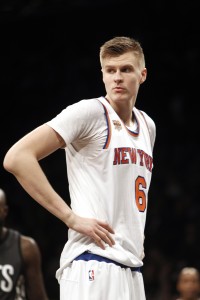 Might Kristaps Porzingis have intentionally published the cryptic Clippers tweet to send a message to Knicks owner James Dolan? Behold a conspiracy theory from the nefarious mind of one New York blogger notorious for having once trafficked in deceit himself to improve standing in the workplace. Richard Bertin of Daily Knicks suggests that the hacking claim rings false and that other motives are at play.
Might Kristaps Porzingis have intentionally published the cryptic Clippers tweet to send a message to Knicks owner James Dolan? Behold a conspiracy theory from the nefarious mind of one New York blogger notorious for having once trafficked in deceit himself to improve standing in the workplace. Richard Bertin of Daily Knicks suggests that the hacking claim rings false and that other motives are at play.
Rating: 7 out of 10 And Anyway, Leaving Your Account Open Isn’t The Same As Being Hacked Eithers
Author: Richard Bertin – @RichardBertin
Link: Kristaps Porzingis’ Clippers tweet
The shock of the Raptors‘ sweep at the hands of the Cavaliers has started to give way to action and a Masai Ujiri exit interview this week reassured fans that he’s well aware of what needs to be done. Adam Corsair of South of the 6ix is comfortable having faith in the Raptors president. A full Ujiri rebuild, Corsair writes, is eerily exciting considering we haven’t actually seen one yet.
Rating: 8 out of 10 Vetoed Knicks Trades
Author: Adam Corsair – @ACorsair21
Link: Ujiri’s options for Raptors offseason
He hasn’t played a game in the NBA yet, but that doesn’t stop the Sixers and their fans from planning a future with Ben Simmons in their lineup. Myles Stedman of The Sixers Sense went through each of the top draft prospects for this upcoming class and discussed how they could fit alongside 2016’s first overall pick.
Rating: 7 out of 10 Mock Draft Addictions
Author: Myles Stedman – @StedsTake
Link: Sixers draft prospects
It’s hard to know just what impact LaVar Ball‘s assumed involvement will have on Lonzo Ball‘s NBA career but Anthony Irwin of Silver Screen and Roll cautions that the most famous father in this year’s draft class is likely licking his chops at the size of the Lakers‘ platform. That could be one of several unnecessary distractions.
Rating: 8 out of 10 Luxury Flip Flops
Author: Anthony Irwin – @AnthonyIrwinLA
Link: Lonzo Ball and the Lakers
With age comes wisdom and a vastly improved three-point shot — the Raptors learned this the hard way not long after the Pacers did last month. Is 32 the new 22? The way LeBron James has been tearing through the NBA seems to suggest as much. For the King James Gospel, Dan Gilinsky wrote about how James and the Cavaliers are looking more dominant than ever.
Rating: 8 out of 10 Goats
Author: Dan Gilinsky – @ArmchairQBDan
Link: LeBron James aging well
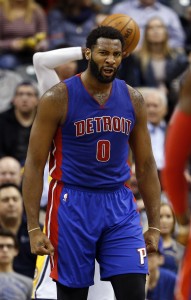 It was a terrible, horrible, no-good, very bad season for Pistons fans, and making matters worse is that Andre Drummond may not fully own up to what went wrong. Steve Hinson of Detroit Bad Boys recently broke down an interview the big man gave and wasn’t too impressed.
It was a terrible, horrible, no-good, very bad season for Pistons fans, and making matters worse is that Andre Drummond may not fully own up to what went wrong. Steve Hinson of Detroit Bad Boys recently broke down an interview the big man gave and wasn’t too impressed.
Rating: 7 out of 10 Mats Of Luscious Shoulder Hair
Author: Steve Hinson – @Shinons8
Link: Andre Drummond discusses Pistons season
It was a rough year for Chandler Parsons this season, as the 28-year-old posted career lows across the board just months after signing a max contract. Still, the most disappointing thing about it wasn’t Parsons’ lack of production, but his lack of awareness as to what it means to commit to the Grizzlies franchise. Joe Mullinax of Grizzly Bear Blues argues that the star should make more of an effort to fit into the Memphis community if he wants to be embraced.
Rating: 9 out of 10 Screencapped Instagram Comments
Author: Joe Mullinax – @JoeMullinax
Link: Chandler Parsons disappointing Memphis season
Minor tweaks to shooting mechanics could help Justise Winslow improve his jumper in much the same way that Kawhi Leonard benefited from slight changes to his own shot. Wes Goldberg of All U Can Heat broke down the Heat forward’s shooting stroke and suggests that establishing a more consistent base could help him increase a woeful 20% “wide-open” three-point percentage.
Rating: 8 out of 10 Spontaneous Physics Tutorials
Author: Wes Goldberg – @WCGoldberg
Link: Justise Winslow shooting mechanics
After a tumultuous few seasons, Lance Stephenson is back with the Pacers and Josh Padmore of 8 Points, 9 Seconds wonders if the swingman can return to near-All-Star form. He argues that Stephenson and the Pacers are just meant to be.
Rating: 7 out of 10 Memes
Author: Josh Padmore – @JPadmore92
Link: Lance Stephenson back with Pacers
Photos courtesy of USA Today Sports Images.
Which Players Are Helping Their Free Agent Stock The Most This Postseason?
The NBA playoffs are a different animal than the regular season beast. The stakes are higher on a night-to-night basis, rotations are shortened, and the margin for error approaches zero. The league notices which players thrive in the NBA’s second season and those players can sometimes reap lucrative deals as a result of their performance.
Cody Taylor of Basketball Insiders compiles a list of which soon-to-be free agents have improved their stocks the most this spring. Jonathon Simmons, JaMychal Green, JaVale McGee, Joe Ingles, and Andre Roberson were the five players who made the scribe’s list, which is in no particular order. Hoops Rumors has decided to take it a step further and rank the players based on the change in perceived market value (it’s worth noting that we are purely speculating). Here’s our rankings of the aforementioned players:
- JaVale McGee (UFA): Entering the postseason, it was unclear if McGee would see the floor. However, he’s carved out a nice role off the bench in limited minutes (11.4 per postseason game) and he should continue to give Golden State a shot-blocking threat for the remainder of their playoff run. He’s making the minimum this year, but it wouldn’t be out of the question for a rival team to offer him an annual salary of $7-10MM with the hopes that he could handle a slightly larger role.
- JaMychal Green (RFA): The Grizzlies entered the 2016/17 season with questionable depth and they badly needed one of their fridge rotation pieces to step up. Green answered the call, showcasing his ability to help the team off the bench. He shot 43.8% from behind the arc this postseason and provided tremendous defense on both post players and wings. He proved he can play when the lights shine the brightest.
- Joe Ingles (RFA): Ingles was a key rotation player for the Jazz all season and he stepped up when it matter most against the Clippers in the team’s opening series. He proved he can contribute to a playoff-caliber team and with the demand for wings with three-point range, he could see a sizable raise on his current $2.15MM salary.
- Jonathon Simmons (RFA): Gregg Popovich continues to show the world how much he trusts Simmons by playing him in crucial situations during San Antonio’s playoff run. The small forward has displayed excellent defensive skills and it wouldn’t be surprising if a rival team hands him an offer sheet that’s simply too lucrative for the Spurs to match.
- Andre Roberson (RFA): Taylor notes that Roberson may have been the second most important player on the Thunder this postseason. While that’s probably true, it’s more of a testament to the team’s roster than it is to Robinson’s impact. The small forward displayed tremendous perimeter defense, though he was a liability on the offensive end and no Thunder player other than Russell Westbrook looked particularly impressive this postseason. Heading into the playoffs, the 25-year-old defender was already in line to see a raise on his current salary. It’s hard to argue that the playoffs increased his value all that much.
Agree with the list? Believe another player belongs on it or that is should be rearranged? Let us know in the comment section below!
Five Key Offseason Questions: Atlanta Hawks
It was an up-and-down season for the Hawks, who kicked off the post-Al Horford era last fall by winning nine of their first 11 games, then losing 10 of their next 11. The team went through several more swings throughout the season, including dropping seven straight games in March while battling for playoff position, and ultimately fell to the Wizards in the first round of the playoffs.
There were some positive signs worth taking away from the 2016/17 campaign, including the development of Dennis Schroder, who improved many of his per-minute averages and his field goal percentage while taking on a significantly larger role. However, Kent Bazemore failed to make similar strides after inking a lucrative four-year deal, and notable free agent addition Dwight Howard grew frustrated with his role down the stretch.
Here are five questions facing the Hawks as they enter the offseason…
1. Which direction are the Hawks headed?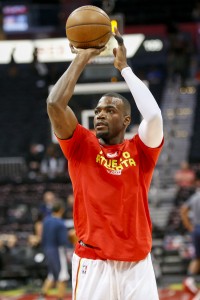
Back in January, Atlanta sent Kyle Korver to the Cavaliers for a future first-round pick and appeared ready to continue to trade players in contract years, including Paul Millsap. However, just days after moving Korver, the Hawks pulled Millsap off the trade market, telling him he wouldn’t be going anywhere.
Korver, a free-agent-to-be in his mid-30s, wasn’t a core piece for the Hawks, but he was still the sort of player who could have helped the team in a playoff series. As such, it was odd that Atlanta would deal him for a future piece and then decide to take a win-now approach anyway.
Coming off a two-year stretch in which its regular-season win total has dipped from 60 to 48 to 43, the franchise will have to be more decisive in determining which direction it wants to go this summer. Is this still a win-now roster, or is it time to take a step back and retool? Front office changes may help in that regard, as there were reports that GM Wes Wilcox and president Mike Budenholzer didn’t see eye-to-eye on the Hawks’ direction. They’ve both been re-assigned and won’t have as much say in personnel decisions, which raises a new question…
